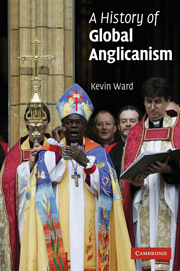Book contents
- Frontmatter
- Contents
- List of maps
- Preface
- List of abbreviations
- 1 Introduction: ‘not English, but Anglican’
- 2 The Atlantic isles and world Anglicanism
- 3 The United States
- 4 Canada
- 5 The Caribbean
- 6 Latin America
- 7 West Africa
- 8 Southern Africa
- 9 East Africa
- 10 The Middle East
- 11 South Asia
- 12 China
- 13 The Asian Pacific
- 14 Oceania
- 15 The Anglican communion: escaping the Anglo-Saxon captivity of the church?
- Maps
- Bibliography
- Index
- Frontmatter
- Contents
- List of maps
- Preface
- List of abbreviations
- 1 Introduction: ‘not English, but Anglican’
- 2 The Atlantic isles and world Anglicanism
- 3 The United States
- 4 Canada
- 5 The Caribbean
- 6 Latin America
- 7 West Africa
- 8 Southern Africa
- 9 East Africa
- 10 The Middle East
- 11 South Asia
- 12 China
- 13 The Asian Pacific
- 14 Oceania
- 15 The Anglican communion: escaping the Anglo-Saxon captivity of the church?
- Maps
- Bibliography
- Index
Summary
INTRODUCTION
In 1800, China, with a population of about 200 million, was by far the largest country in the world, about twice the size of India. There had been a Christian presence in the country since the thirteenth century, first Nestorian monks, then Roman Catholic friars. The work of the Jesuits proved particularly fruitful. Matteo Ricci's mission to the mandarin class gave the Jesuits access to the Manchu court, and some prominent officials and intellectuals converted. Later the Jesuits fell under suspicion – firstly by the Vatican for their attempts to interpret the Christian message in Chinese terms, and then by the Manchu for their foreignness. Missionaries were expelled in 1724 and Chinese Christianity was banned, though isolated Catholic communities continued a clandestine existence. Robert Morrison, a British Congregationalist missionary working for the East India Company, began Protestant activity in China in 1807, operating at first in a clandestine way. It was the start of a considerable Protestant interest, in which Americans were the major participants. By the end of the century there were some 1,300 Protestant missionaries operating in China; Catholics had also returned.
China never formally fell under colonial rule. Gradually a weak Chinese government was forced to make trading concessions to western powers which seemed to undermine its sovereignty and enfeeble its grasp of power. The humiliating end of the Opium War in 1842 (in which Britain had insisted on its right to trade in opium) opened up five treaty ports to western trade and commercial settlement.
- Type
- Chapter
- Information
- A History of Global Anglicanism , pp. 244 - 259Publisher: Cambridge University PressPrint publication year: 2006



